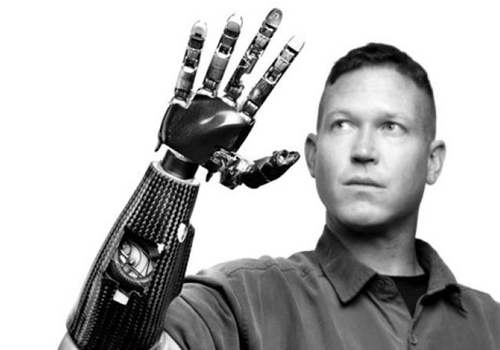
There's a curious contradiction in the 'evolution versus creationist' debate. One side credits our survival to chaotic circumstances, where chance and fate dictated which traits were "naturally" selected. The other side claims intelligent design played the pivotal role in our supremacy. The truth of the matter is, our species has historically enjoyed a bit of both.
If you take the deity out of the equation, we have a long history of meeting nature's threats with our own uniquely designed solutions. By paving roads, farming crops, wearing clothes and building cities we've continually reshaped the world around us to cater to our evolving needs. Our ingenuity became the main expression of our natural selection. Complexity and scale aside, there's little difference between us and the ants digging tunnels beneath the soil. Survival of the fittest has become survival of the most adaptive, and the evolution of intelligence is measured in how quickly (or preemptively) we participate in those adaptations. It only makes sense, therefore, that we now seek to fix design flaws within our own bodies.
Being social creatures in a globalized age, however, also means that our modern innovations tend to change our species as a whole. Airplanes allowed us to traverse the globe in a matter of hours, dramatically accelerating human migration. Medicines fight against viruses and bacteria, keeping our last natural predators at bay. The Internet unifies our collective voices around a common campfire, ensuring the greatest possible wealth of knowledge. Humanity is slowly but surely becoming a collective hive. Progress towards this grand scale unity has thus far been wrought with conflict, and none of these innovations came without painstaking labor, research and failures. Crossing the gulf from the beastly to the divine will often require us to play God, as we messily discover as many dangers as we do solutions.
If you take the deity out of the equation, we have a long history of meeting nature's threats with our own uniquely designed solutions. By paving roads, farming crops, wearing clothes and building cities we've continually reshaped the world around us to cater to our evolving needs. Our ingenuity became the main expression of our natural selection. Complexity and scale aside, there's little difference between us and the ants digging tunnels beneath the soil. Survival of the fittest has become survival of the most adaptive, and the evolution of intelligence is measured in how quickly (or preemptively) we participate in those adaptations. It only makes sense, therefore, that we now seek to fix design flaws within our own bodies.
Being social creatures in a globalized age, however, also means that our modern innovations tend to change our species as a whole. Airplanes allowed us to traverse the globe in a matter of hours, dramatically accelerating human migration. Medicines fight against viruses and bacteria, keeping our last natural predators at bay. The Internet unifies our collective voices around a common campfire, ensuring the greatest possible wealth of knowledge. Humanity is slowly but surely becoming a collective hive. Progress towards this grand scale unity has thus far been wrought with conflict, and none of these innovations came without painstaking labor, research and failures. Crossing the gulf from the beastly to the divine will often require us to play God, as we messily discover as many dangers as we do solutions.
So what are some of the life altering technologies being cultivated today? And how might they redefine what it is to be human? The Biotechnology industry regularly pioneers designs that seek to improve the human body's complex mechanisms. There are several companies poised to reach revolutionary milestones as they work to make their products commercially viable:
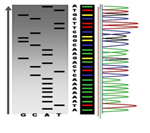 DNA sequencing has seen drastic improvements in speed and costs. We've gone from the multi-billion dollar Human Genome Project in 2003, to companies that can process DNA at $1,000 per genome. We've mapped thousands of people's hereditary information, opening the door to the possibility of highly personalized medicines replacing the common one-pill-suits-all approach.
DNA sequencing has seen drastic improvements in speed and costs. We've gone from the multi-billion dollar Human Genome Project in 2003, to companies that can process DNA at $1,000 per genome. We've mapped thousands of people's hereditary information, opening the door to the possibility of highly personalized medicines replacing the common one-pill-suits-all approach. Tissue Engineering passed a landmark when Scientists at Wake Forest created a 3D printer capable of making artificial cartilage. The "electrospinning" process creates extremely thin plastic polymer fibers which healthy cartilage cells grow around, allowing for a rejuvenation of elasticity and mechanical function in our joints. As soon as human trials are complete, Arthritics around the world will celebrate a return to mobility. Wake Forest is also pursuing organ printing, including kidneys and hearts customized to each patient's DNA.
Tissue Engineering passed a landmark when Scientists at Wake Forest created a 3D printer capable of making artificial cartilage. The "electrospinning" process creates extremely thin plastic polymer fibers which healthy cartilage cells grow around, allowing for a rejuvenation of elasticity and mechanical function in our joints. As soon as human trials are complete, Arthritics around the world will celebrate a return to mobility. Wake Forest is also pursuing organ printing, including kidneys and hearts customized to each patient's DNA. 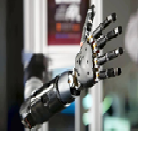 Mind-controlled prosthetics developed by DARPA and John Hopkins allow patients who've lost limbs or suffered spinal injuries to regain their dexterity through complex robotic arms. Patients control the limb via microchips implanted in their brain, capable of decoding neural signals into accurate movements.
Mind-controlled prosthetics developed by DARPA and John Hopkins allow patients who've lost limbs or suffered spinal injuries to regain their dexterity through complex robotic arms. Patients control the limb via microchips implanted in their brain, capable of decoding neural signals into accurate movements.  Retinal Implants, a German company, have manufactured a sub-Retina implant that successfully restored vision to some blind patients. One more innovation in an ever increasing array of technologies augmenting and improving our bodily functions.
Retinal Implants, a German company, have manufactured a sub-Retina implant that successfully restored vision to some blind patients. One more innovation in an ever increasing array of technologies augmenting and improving our bodily functions.
As impressive as these specified solutions may be, they stand to be collectively overshadowed by one particularly significant Bio-medical development...a holy grail once considered science fiction fantasy: Gene Therapy.
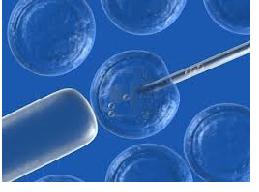 We currently have the ability to go directly into our DNA and swap genes around. We'll soon know which bad genes can be substituted with good ones, preventing or curing several diseases like cystic fibrosis and muscular dystrophy - and without the use of drugs or surgery. Being able to turn off or remove certain genes will utterly revolutionize the medical profession.
We currently have the ability to go directly into our DNA and swap genes around. We'll soon know which bad genes can be substituted with good ones, preventing or curing several diseases like cystic fibrosis and muscular dystrophy - and without the use of drugs or surgery. Being able to turn off or remove certain genes will utterly revolutionize the medical profession.
A few steps down the road, and we'll be able to use gene manipulation to pursue 'enhancements' such as increased memory or intelligence. It won't be long before we combine the practice with RNA interference, controlling our internal mechanisms and changing every facet of our body. This will be the most significant paradigm shift of all. Imagine creating customized viruses designed to implant improved RNA made up of our own genes into every cell in within our body. We'll be able to transform back into younger versions of ourselves through natural regeneration. A whole new market of purely aesthetic changes will also undoubtedly emerge: requests for increased height, muscle density, cleavage size, eye color, hair length, etc. We will enter the age of blueprints for dream bodies, modifiable and adaptable to our will. The era of designer babies.
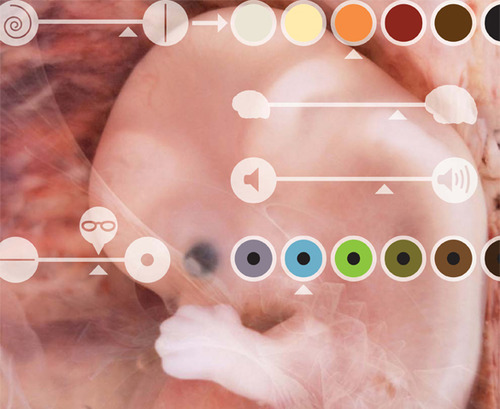
There is another side to the coin of course. There are those who predict the emergence of a technological class system, separating naturalists from those who can afford enhancements. The potential exists for two or more distinct new species to develop among us, separated by a combination of significant genetic advantages. This also only considers the scope of individual consumer level selections, but what about national programs forcibly instituted by governments? Increased fertility to boost populations? Increased violence in soldiers? Docile obedience in citizens? Control of sexuality? It's easy to imagine what some of history's dictators might have done with this power.
Finally, what about the philosophical component? The derisive dispute between Evolutionists and Creationists is not merely a disagreement over our origins. These conflicting factions will most likely form the groups who are either ready to venture into the technological age, or too resistant to change to adopt it. The component of human character we call 'faith' is a fascination with the unknown, a desire for the mystical quality of the undiscovered. Science is a balanced discipline of control, seeking to understand and shape the world around us. The marriage of these two qualities is at the core of human curiosity, we yearn to understand while always looking to new frontiers. It's worth asking whether the human spirit will burn as brightly when our emotions are regulated through refined drugs and our bodies maintained through complex machinery? Will we one day yearn for the unpredictable frailty of our former chaos?
The gleaming civilization we stand on today was forcibly imported onto a land once home to natives. They were slaughtered so that a new way of life could be built. The advent of industry offered new comforts, but at what cost? No sooner have we accepted a new paradigm than another arrives to render it obsolete, and we often lose good along with the bad – safety and security at the cost of wisdom; information at the cost of wonder. It is a great accomplishment to master our internal mechanisms, but every time we've pursued a technological advancement it's become a change that is rarely undone. We must ask ourselves, what are we giving away to gain this new advantage? Is this path a way to abandon our true selves? Or become our true selves?
In this age of accelerating transformation, technology advances almost faster than we can understand it. Ideally we can keep the flame of our ambition burning, while being vigilant in how we shape it. It seems surreal to imagine our future might look like what's been described above, but none of these technologies are theoretical...they're already here. We are the co-creators of our fate, and we can no longer afford to idly wait for the next wave of change to decide what survives. Let us ensure the next great human leap isn't built on a foundation of broken ideals.

No comments:
Post a Comment